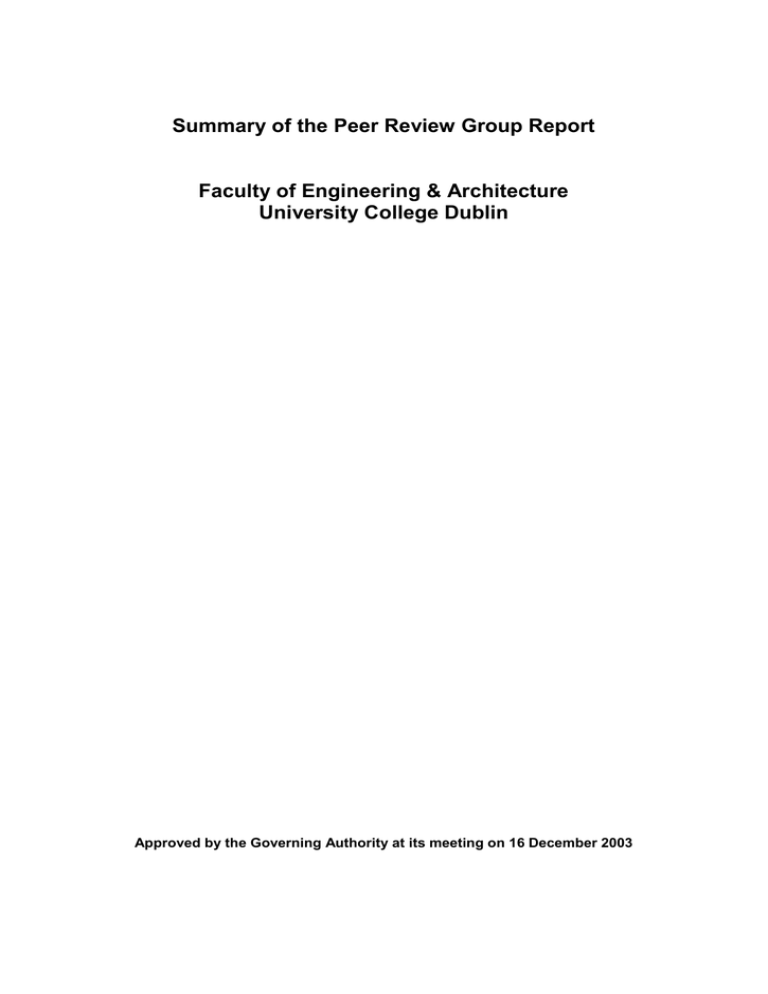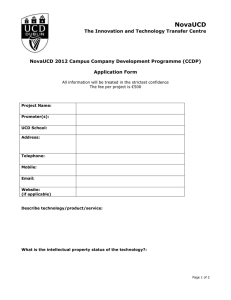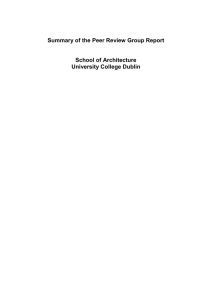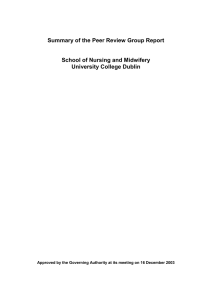Summary of the Peer Review Group Report University College Dublin
advertisement

Summary of the Peer Review Group Report Faculty of Engineering & Architecture University College Dublin Approved by the Governing Authority at its meeting on 16 December 2003 Faculty of Engineering & Architecture Members of the Peer Review Group NAME AFFILIATION ROLE Professor Michael J Kennedy Dean, Faculty of Science, University College Dublin Chair Professor Mary Lambkin Dean, Postgraduate & Interdisciplinary Studies, University College Dublin Rapporteur Professor Philip Bourke Dean, Faculty of Commerce, University College Dublin Cognate Professor John I Sewell University of Glasgow Extern Dr John L Anderson Carnegie Mellon University Extern Professor Adrian E Long Queen’s University Belfast Extern Professor André De Herde Université Catholique de Louvain Extern Members of the Faculty Co-ordinating Committee Mr. Liam Carroll Dr. Peter Clinch Dr. Michael Gilchrist Mr. Gerard Hayden Mr. Patrick Kearney Professor J. Owen Lewis Ms. Deirdre Lynch Dr. Don MacElroy Mr. Brian Mulkeen Professor Eugene O’Brien Dr. Paula Russell Ms. Phil Ryan Mr. Michael Wren Principal Technician, Department of Electronic and Electrical Engineering Senior Lecturer, Department of Environmental Studies Senior Lecturer, Department of Mechanical Engineering Section Head Technician, School of Architecture Principal Technical, Department of Civil Engineering Dean, Faculty of Engineering and Architecture, Chairman Senior Administrative Officer, Faculty of Engineering and Architecture, Editor Senior Lecturer, Department of Chemical Engineering College Lecturer, Department of Electronic and Electrical Engineering Head, Department of Civil Engineering College Lecturer, Department of Regional and Urban Planning Senior Executive Assistant, Department of Agricultural and Food Engineering Postgraduate Student, Department of Electronic and Electrical Engineering Summary PRG Report, Faculty of Engineering & Architecture, UCD 2 Faculty Details The Faculty currently occupies space in the Belfield Campus, Earlsfort Terrace and Richview. Integration of the Earlsfort Terrace Engineering Departments with the other Faculty Departments on the Belfield campus has been an issue of the highest priority for many years. This should ensure that all engineering lectures and facilities are available on the Belfield Campus and that the full potential of many research interactions can be realised. At the time of writing it would appear that the Earlsfort Terrace based departments will be accommodated in the Philips Building, which has recently been acquired by the University, and which will enable the expansion of the Richview complex which currently accommodates the School of Architecture and the Departments of Environmental Studies and Regional and Urban Planning, as well as Urban Institute Ireland. This is a positive and welcome initiative, although it is of the utmost importance that the financial resources that will be made available to effect the relocation are sufficient to ensure that the needs of all eight departments are satisfied. Each member of academic staff is allocated an individual office. In the Belfield Engineering Building, each office has a floor area of approximately 12m 2. Heads of Department have an office space of double this size. Common Room areas in Earlsfort Terrace and Richview are communal to all staff whilst in the Engineering Building at Belfield the Academic staff and the Technical and Administrative staff use separate Common Rooms. There are 154 staff in the Faculty – of the 88 Academic staff, 71 are full-time permanent, 4 are permanent part-time, 10 are temporary and 3 are temporary parttime. The Administrative staff numbers 14 and a “half-time" administrative officer. The 52 Technical staff comprise 43 permanent, 8 temporary and 1 temporary part-time. Engineering degrees which meet the educational requirements for Chartered Engineer status in Ireland are of four years duration. UCD offers six such Bachelor of Engineering (BE) degrees through the five departments of Agricultural and Food, Chemical, Civil, Electronic and Electrical, and Mechanical. The undergraduate degree in Architecture is structured in two parts: the first three years is seen as a basic foundation course leading to a BSC (Architectural Science) degree. The final two years involve more substantial and sophisticated design and research projects leading to the BArch degree. Taught, research and professional degrees are offered in some departments with all departments offering PhD degrees. There were 127 PhD students registered in 2002/03. Site Visit The site visit took place between 30 March and 2 April 2003. The PRG met with the Dean of the Faculty, the Faculty Executive Committee, academic staff, technical staff, administrative staff, students at all levels, employers, the Bursar, Vice-President for Research, the Librarian, the Registrar and the Director of Computing Services. The PRG also conducted private meetings with individual members of staff. The PRG was warmly received at each location and by all of the people with whom it met. Our impression of the staff was of a highly professional, strongly committed group who take great pride in their work and particularly in the excellent level of Summary PRG Report, Faculty of Engineering & Architecture, UCD 3 service that they give their undergraduate students. Less confidence was evident concerning their research activities with modest mention of a range of activities rather than any strong claims to be leading edge. Comments and suggestions were generally positive with lack of inclusiveness and inadequate communication being the main negatives. The students with whom the PRG met were bright and articulate and seemed broadly happy with their experience in UCD. However, their comments on teaching methods were quite critical, particularly the lack of interaction with staff in their early years. The PRG also noticed that almost all of the students and staff are Irish nationals with very little evidence of internationalisation in the Faculty. Recommendations of the Peer Review Group Recommendations on many individual points have been made in the body of this report but the key recommendations may be summarised as follows: The Faculty needs strong leadership in the development and implementation of a strategy for the future and it is imperative that the Dean receives the necessary latitude and support to enable this to happen. However, the Dean and senior administration must develop incentives for all staff to reach the strategic goals especially in expanding the research enterprise. The Faculty must take responsibility for its own resources, beyond the provision of basic infrastructure and core staffing, and must develop a proactive fundraising strategy to do this. The Faculty must be more inclusive in its style of management, giving representation to all categories of staff on key committees, and removing divisive practices such as having separate tea rooms and other facilities for separate staff categories/departments. Training should be provided for technical staff. The curriculum and pedagogy of its teaching programmes needs a fundamental review - there is a need to increase interaction with students and to implement a regular course evaluation scheme. The objective for the Faculty’s research must be to focus on selective areas in which it can develop a competitive advantage and to aim to produce leading edge research in those areas. It must concentrate on areas of strength and upgrade these. Expansion in some areas may be unsuccessful due to competition. Funding for the Faculty’s research programme is considered to be seriously inadequate - as a guide it is suggested that the annual research budget should considerably exceed the Faculty’s operating income of €20million. Postgraduate students should be annually assessed and there should be a more formal transfer of students from MSc to PhD. The number of PhD students is key to the research agenda and this needs to be increased significantly - a guide of 2.5 students to each full-time staff member is suggested which amounts to a doubling in the number currently enrolled. The Summary PRG Report, Faculty of Engineering & Architecture, UCD 4 research enterprise and the research student population will be the prerequisite for success in the twenty-first century. A corollary to this is that the proportion of research active staff needs to be substantially increased which should be possible given the natural turnover that will occur in the near future. This is an opportunity which the Faculty must grasp with all hands. The University must address the inadequacy of the computer network. The Faculty’s development for the coming years should be characterised by innovation in all areas of its activities and expansion in those areas of competitive advantage, with a particular focus on industry interaction and internationalisation. Response of the Faculty Co-ordinating Committee The Faculty Co-ordinating Committee submitted a half page in response to specific details of the PRG Report and this is included as Chapter 8 of the Report. A copy of the full Peer Review Group Report is available from the Quality Assurance Office. Summary PRG Report, Faculty of Engineering & Architecture, UCD 5





